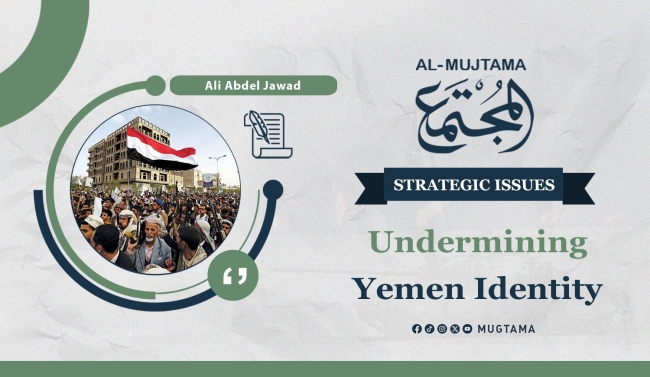The national identity is considered one of the most important pillars that constitute the essence of people and distinguish them from others. It is the spiritual bond that unites individuals under one banner, characterized by belonging and loyalty to their homeland.
In Yemen, national identity forms a fundamental element in building a stable and prosperous state that everyone aspires to. Given the complexities of the political, social, and economic realities in Yemen, education emerges as a crucial tool in promoting and solidifying this national identity.
Amid the profound transformations affecting Yemeni society, the importance lies in constructing a strong and cohesive national identity based on true citizenship values that transcend tribal or sectarian affiliations. Only through cementing this national identity can the people unite and collectively strive towards achieving the desired stability and progress.
Educational curricula play a pivotal role in constructing this identity, serving as the fundamental pillar through which national values can be conveyed and imprinted in the minds and hearts of new generations. Additionally, curricula stimulate students to consider national identity as an integral part of their personal identity. This contributes to the development of national characters capable of cherishing their heritage and contributing to their country's development.
Given the significant challenges facing education in Yemen, such as armed conflicts and the destruction of educational infrastructure, updating curricula and ensuring students' access to quality education have become vital. Efforts to update and integrate curricula with Yemen's cultural and social context reflect a genuine readiness to enhance and embody national identity within education. This effort also helps curb the Houthis' attempts to substitute Yemen's national identity with another based on their ideological convictions.
Therefore, the message of Yemeni education remains clear and specific: building a cohesive and strong national identity is fundamental to achieving stability and progress. Through updating educational curricula to include national, historical, and cultural values, Yemen can achieve the ambitious goal of nurturing a generation capable of building a promising and prosperous future, proud of its heritage, and contributing to the advancement of their country.
Updating Curriculum to Enhance National Identity
Professor Aref Naji Ali, an advisor at the Yemeni Ministry of Education, believes that vigorous efforts are undertaken in the Yemeni-liberated areas by the Houthis, under the authority of the legitimate government, to reform educational curricula. These efforts aim to align with current and global developments while emphasizing the cultivation of values of belonging and national identity among students through:
- Including historical content in educational curricula that highlights the achievements of the nation and its civilization, aiming to introduce students to the history and rich heritage of their country.
- Focusing on teaching students national values such as freedom, justice, equality, and tolerance.
- Giving significant attention to teaching students the Arabic language, enabling them to express themselves and better understand their culture.
- Incorporating geographical content to introduce students to the geography of their country, familiarizing them with its location on the map, its different regions, and natural resources.
- Organizing national activities in schools periodically, such as celebrating national holidays and presenting plays that depict the history and civilization of the nation, aiming to enhance students' sense of belonging and loyalty to their country.
- Instilling in students the values of patriotism and pride in their country, by teaching them the importance of the nation in their lives and their responsibilities towards it.
Overall, these modifications aim to elevate the concept of the homeland above tribes and regions, forging a unified national identity for all Yemeni citizens.
The Houthis and Undermining Yemeni Identity
Since their coup against the state and its institutions nearly nine years ago, the Yemeni Houthi group has pursued an ideological educational policy. Many experts describe it as a systematic strategy to obliterate Yemen's national identity, which does not align with their ambitions to govern the entire country.
Dr. Mukhtar Al-Mashushi, Director General of Curricula, believes that the Houthis have altered educational curricula in their controlled areas to serve their ideology by undermining the pillars of the Yemeni state and society and destroying the national identity.
The Houthi group has made radical changes to educational curricula, removing lessons dedicated to Yemeni national symbols and introducing lessons focused on sectarian figures. This is an attempt to fill the students, especially the young, with their tribal and sectarian ideologies. The group is actively working on multiple fronts to tear down education in Yemen, withholding teachers' salaries and altering curricula to undermine Yemen's sovereignty and entrench the principle of guardianship as a supreme political idea.
Among the prominent changes made by the Houthis to replace Yemeni national identity were:
- Changing educational curricula from grades one to four of primary school, following a demand by the group's second-in-command, Mohammed Ali al-Houthi, in April 2022.
- Adding subjects related to the biography of the group's founder, Hussein Badreddin al-Houthi, citing from his speeches.
- Introducing religious subjects related to their own interpretation of Islamic history.
- Incorporating military terminology into children’s school curricula aimed at promoting the recruitment of children, controlling them, and facilitating the shaping of their identity.
Current Educational Situation
According to UNICEF, there are 2.4 million Yemeni children currently out of the education system, with the potential for this number to rise to 6 million. At least one in every four schools in Yemen has been damaged or partially destroyed due to the ongoing war.
A generation of Yemeni children born at the outset of the conflict or educated in Houthi-controlled areas faces an uncertain future. Nine years of catastrophic war have severely impacted the education sector, which was supposed to be the hope for future reconstruction. This leaves an entire generation of Yemen's children without a clear understanding of their national identity, which is crucial for defending their country and securing their future. This situation poses a threat to these generations by leaving them with no identity.
-------------------------------------------------------------


